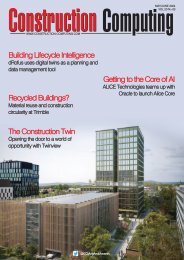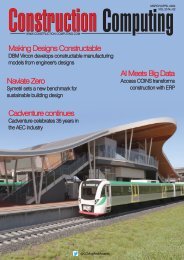Create successful ePaper yourself
Turn your PDF publications into a flip-book with our unique Google optimized e-Paper software.
INDUSTRYfocus<br />
Leveraging change<br />
Kenny Ingram at IFS believes that housebuilders should see Covid-19's disruption of the housing<br />
market as an opportunity to adapt to a rapidly evolving sector of the construction industry<br />
The Covid-19 pandemic has caused<br />
house sales to slow dramatically in<br />
many countries, forcing<br />
housebuilders worldwide to take stock<br />
now to ensure their future success. As<br />
countries come out of lockdown housing<br />
sales volumes will obviously start to pick<br />
up again, but how long will it be before<br />
they return to pre-Covid-19 levels, and<br />
will house prices recover from the slump<br />
or fall further? What, if anything, can<br />
housebuilders do to manage this<br />
disruption and uncertainty?<br />
STIMULATING THE MARKET<br />
Governments everywhere are doing all<br />
they can to stimulate markets by<br />
lowering interest rates, reducing taxes or<br />
honing stamp duty charges. The impact<br />
of these changes is unpredictable.<br />
Potential house buyers are also nervous<br />
about making big commitments and<br />
taking on loans alongside concerns<br />
about employment security and the risk<br />
that house prices may fall further.<br />
There is a global shortage of housing<br />
however, so there is a need in most<br />
countries to build more houses - and<br />
Concrete form work using prefabricated sections<br />
build them faster. This housing shortage<br />
is heavily skewed towards lower price<br />
bands with affordable housing a major<br />
issue in many countries. This has driven<br />
an acceleration of the 'Build to Rent'<br />
market in countries like the UK.<br />
Incomes have grown at a much slower<br />
rate than house prices in the last past<br />
decade, so even before the Covid-19<br />
crisis many countries were seeing<br />
pressure on prices, and the market was<br />
overdue a correction. There is also a<br />
strong likelihood that housebuilder<br />
margins will be squeezed in the<br />
short/medium term and that future<br />
market conditions will not be as<br />
favourable as they have been over the<br />
last 10 years.<br />
The truth is that no one knows what will<br />
happen to the market over the next few<br />
months and years. As a result,<br />
housebuilders need to be agile and able<br />
to change direction very quickly. The<br />
good news is that many housebuilders<br />
have made large profits over the last few<br />
years-so they are in a strong position to<br />
be able use this cash now to invest in<br />
making their businesses future proof.<br />
LABOUR SHORTAGE IMPLICATIONS<br />
The construction industry has been facing<br />
a major skills shortage in many countries.<br />
The industry struggles to attract the<br />
younger generation and as a result we<br />
have an aging workforce issue which<br />
continues to grow. Labour shortages<br />
result in increased labour rates, leading to<br />
companies employing more unskilled<br />
and/or inexperienced people who will be<br />
much less productive, thereby forcing up<br />
construction costs and build quality will go<br />
down. It also constrains the capacity of<br />
the industry to build more homes.<br />
In the short-term, as housing demand<br />
has slowed because of the Covid-19<br />
crisis, some homebuilders and<br />
subcontractors have chosen to cut their<br />
headcount, But that kind of reaction could<br />
be a mistake, as they may not be able to<br />
rehire these skilled resources when<br />
demand returns, leaving them with an<br />
even more acute labour shortage. How<br />
will we build more homes if the labour<br />
capacity is not available?<br />
Poor quality, in the form of large<br />
numbers of defects, is also damaging<br />
many housebuilder's brand reputation.<br />
This has a huge impact on costs, as large<br />
amounts are being spent on correction<br />
work, making the labour shortage even<br />
worse. O&M performance consultant Peter<br />
Furst says that costs resulting from poor<br />
craftsmanship across the construction<br />
industry as a whole are as high as 12<br />
percent of a total project cost, and<br />
consume 11 percent of its project hours.<br />
When we talk about productivity there is a<br />
tendency to focus on site-based<br />
construction processes, but it is also critical<br />
that management tasks and processes are<br />
executed in an efficient way. There is<br />
usually a productivity and project control<br />
issue here as well. Most housebuilders are<br />
running their business with outdated and<br />
non-integrated business systems, with<br />
tools like Excel spreadsheets certainly<br />
14<br />
<strong>Jul</strong>y/<strong>Aug</strong>ust <strong>2020</strong>

















